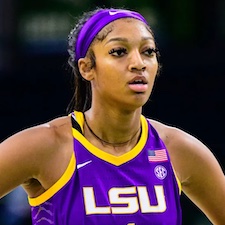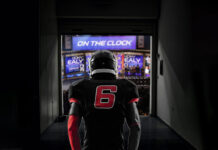by Jewel Clark and Rachel Wilson Patterson

For decades, Black women athletes have been subjected to the harsh and at times unforgiving gaze of White America. Our physical bodies, athleticism, energy, enthusiasm, and success are frequently scrutinized. We can be aggressive on the basketball court, but doing so anywhere else earns us the moniker of the “angry Black woman.” We can be athletic, but not too athletic lest we be critiqued as too masculine. Decisions are often made about who we are, how we are, and what we can achieve before we set foot on the court. Determinations are made around our abilities based on preconceived notions as well as inaccurate perceptions.
Over the years, Black women athletes have been called a myriad of destructive, negative, and patronizing words ultimately questioning our humanity. Far too often, the greatness of Black women is systematically and painfully undercut by sinister tropes laced in prejudice and racism. We must disrupt this pattern by doggedly protecting the hearts, minds, and spirits of Black women and celebrating their achievements. Who will protect Black women college athletes?
“Language influences inclusion,” psychologist Odessa S. Hamilton astutely noted, “The reality is that what we think typically underlies what we say, particularly in moments of thoughtless intention.” Stated simply, what we say, particularly when we are not mindful, often reflects what we genuinely believe. If what we say is often a reflection of what we think, it is fair to conclude that some members of the media see Caitlyn Clark of the University of Iowa and Angel Reese of Louisiana State University as polar opposites. The former being one whose behavior demonstrates skill, talent, and entertainment; the latter whose actions are boorish, unrefined, and uncouth. This characterization aligns squarely with racist, prejudiced, and dangerous tropes about Black people, ultimately suggesting that we are somehow unmannerly or uncultivated as compared to our White peers.
Let us take a look at how some members of the media described Caitlin Clark during the recent NCAA basketball tournament. Caitlin Clark is “one of the most talented and entertaining players in the history of college basketball. Clark is a skilled trash talker and used the John Cena ‘you can’t see me’ taunt multiple times throughout the tournament.”
When Angel Reese made the same John Cena motion with her hands, members of the media called Reese a “classless piece of sh*t,” a “f–ing idiot” as well as “mindless” and “classless.”
While each of the aforementioned descriptors refers to the same on-court behavior, for Clark, the connotation is obviously positive. She is lauded for outlandish and unsportsmanlike conduct. By contrast, Reese is the “problem child” who needs to be chastised, punished, and taught the difference between acceptable and unacceptable basketball decorum. The media largely encouraged how this unbalanced comparison unfolded.
After losing to Iowa in the semifinals of the Final Four, coach Dawn Staley of the University of South Carolina addressed members of the media. During the postgame press conference, she admonished the press to be mindful of the words used to describe her team. Coach Staley shared she was aware of a prominent member of the media speaking negatively about her players. She aptly corrected the misnomer, stating: “We are not bar fighters, we are not thugs, we are not monkeys, we are not street fighters. This team exemplifies how you need to approach basketball on the court and off the court.”
Distinctly and selectively spoken, this perverse language – hurtful, denigrating, and inaccurate – does nothing more than reinforce racist stereotypes about Black women athletes.
During the Final Four South Carolina-Iowa postgame press conference, Aliyah Boston was asked about the impact Coach Staley had on her experience at South Carolina. Mid-response Boston began to cry while simultaneously expressing to those in the room that she did not want a picture of herself crying to leave the room. She laughed, perhaps to ease the situation. Staley, however, firmly repeated, “No pictures please,” and held up her hand in a “stop” gesture. Yet, a picture of Boston after wiping away tears headlines at least one website. A University of Iowa affiliate publishing the picture was both distasteful and disrespectful. Such actions underscore a blatant and ubiquitous disregard for Black women. If Caitlin Clark made this same request, would the media have honored her desires?
Black women deserve an ever-enduring shield of love and support. Black people, particularly Black women, have often come to the defense of other Black women to protect them from what can at times be the unremitting, unforgiving attack of the White gaze. After the South Carolina Gamecocks lost to Iowa in the Final Four, the mistreatment against the former was in full force. Boston used her 6’5” frame to safeguard Zia Cooke from the cameras’ lenses. Boston is all too familiar with the experience of having one’s crying face plastered over media outlets for months. She did not want Zia Cooke – friend, teammate, and fellow Black woman – to endure that same scrutiny. Boston guarded the physical body of Zia Cooke. Who will protect this house? Aliyah Boston will protect this house.
In February 2023, coach Dawn Staley put a stop to Geno Auriemma’s attempt to blaspheme her team’s style of play. Geno Auriemma, head coach of the women’s basketball team at the University of Connecticut, said, “I didn’t say anything for a long, long, long time. And I just felt like — you want me to bring Lou in and see the bruises? It’s just appalling what teams do to her now. It’s not basketball anymore. It’s not basketball anymore. So that was the problem.”
Staley defended her players by stating “they play the right way, and approach it the right way whether they win or lose. We don’t denounce anybody’s play. They are always uplifting the game of women’s basketball, and when we were getting our heads beat in by UConn for all those years, I said nothing.” Dawn Staley secured the integrity of her players and her program. Who will protect this house? Dawn Staley will protect this house.
Much of the dialogue around the 2023 NCAA Women’s Basketball Championship has surrounded the Caitlin Clark/Angel Reese-John Cena hand gesture saga, and/or the greatness of Clark. We must keep that same energy to affirm, uplift, celebrate, and applaud the Louisiana State University women’s basketball players and coaches for their amazing success. We will both fiercely guard our Black women college athletes and champion their success. Who will protect this house? We will protect this house.
Jewel Clark and Rachel Wilson Patterson are former teammates at the University of Pennsylvania. Clark was most recently named a Legend of Ivy League Basketball. She was the 2003-04 Ivy League and Big 5 Player of the Year. She currently resides in Maryland and works as a dual-certified public school teacher and high school girls’ basketball coach.
Since graduating from Michigan Law in 2011, Patterson has focused on diversity, equity, and inclusion initiatives with nonprofit organizations, pipeline programs, law schools, and the legal profession. She currently resides in Washington D.C., and works as a DEI professional.











I agree with your insightful essay, especially its point that
language matters in describing Black athletes . John Thompson
faced these same issues when writers and broadcasters described
his Georgetown team with unflattering language conveying the notion
they were unsportsmanlike in their approach to the game of basketball.
… History is repeating itself , but not without your eloquence retort.